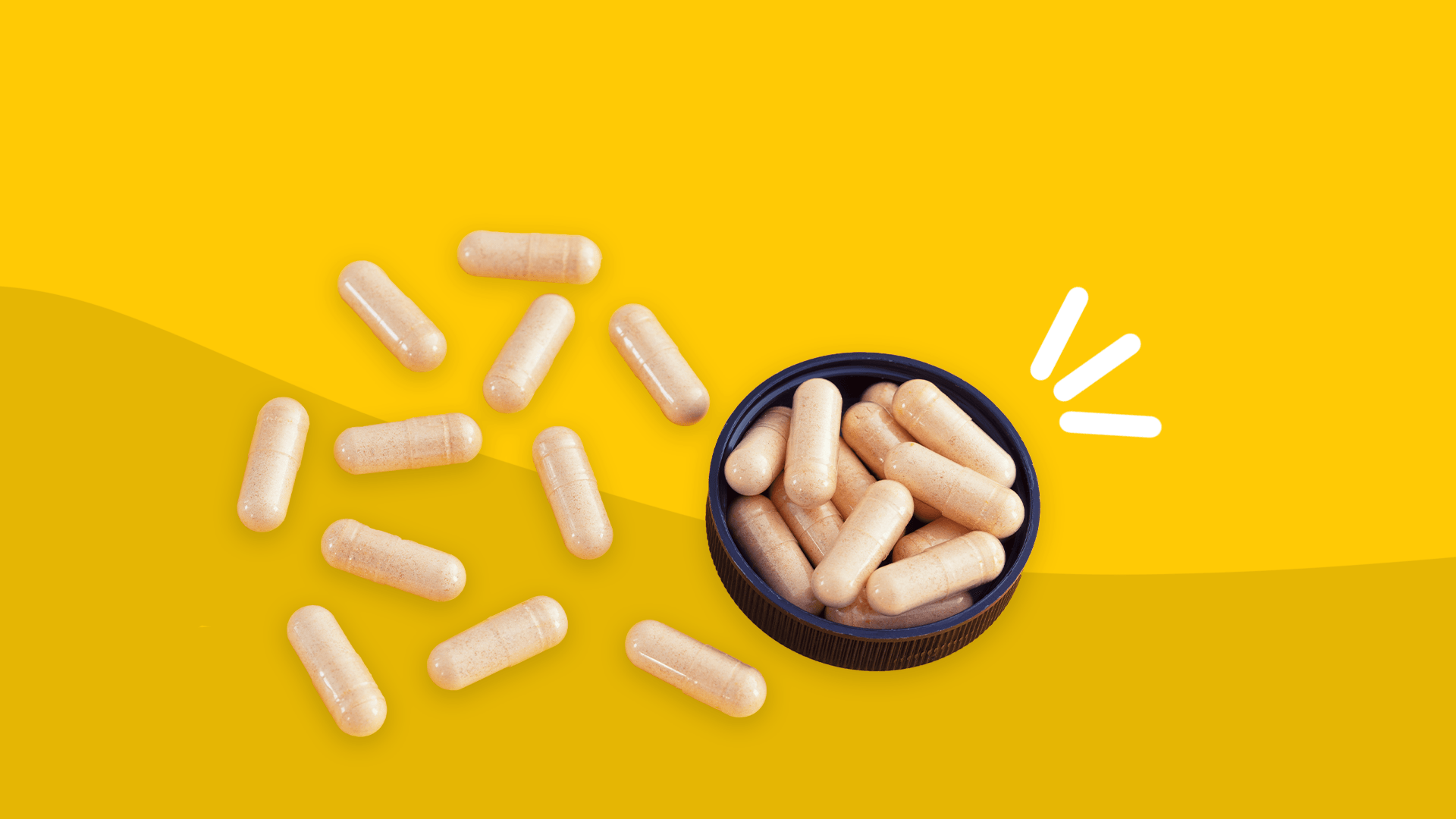Niacin, or vitamin B3, is one of the essential B-complex water-soluble vitamins that the body needs to turn food into energy. All of the vitamins and minerals are important for optimal health, but niacin is especially good for the nervous and digestive systems. Let’s take a more in-depth look to better understand niacin benefits and its side effects.
RELATED: Free niacin coupons | Get niacin details
10 niacin benefits
Niacin is naturally present in many foods and is available in supplement and prescription form, so it’s easy to get enough niacin and reap its health benefits. Tissues in the body convert niacin into a usable coenzyme called nicotinamide adenine dinucleotide (NAD), which is used by more than 400 enzymes in the body to perform essential functions.
Although niacin deficiencies are rare among people in the United States, they can become severe and cause a systemic disease called pellagra. Mild cases of pellagra can cause diarrhea and dermatitis, while more severe cases can cause dementia and even be fatal.
Pellagra is most common among adults between the ages of 20 to 50 years old, but it can be avoided by consuming the recommended dietary allowance (RDA) of niacin. The adult RDA for niacin is 14 to 16 mg per day. Niacin is readily available in foods like fish, chicken, beef, turkey, fruits, and vegetables. Niacin can also be made in the body from the amino acid tryptophan. This amino acid is found in foods such as chicken, turkey, nuts, seeds, and soy products.
Niacin is also in many over-the-counter multivitamins as a dietary supplement. Both Nature Made and Centrum adult multivitamins contain 20 mg of niacin per tablet, which is about 125% of the adult RDA. Nicotinic acid and nicotinamide are two forms of niacin supplements. Over-the-counter supplements of niacin are available in a variety of strengths (50 mg, 100 mg, 250 mg, 500 mg) that are higher than the RDA. Prescription forms of niacin include brand names such as Niaspan (extended-release) and Niacor (immediate-release) and are available in strengths as high as 1,000 mg. Niacin can be found in an extended-release formulation to lessen some side effects.
While more studies need to be conducted and supporting evidence must be determined, there are a variety of uses for niacin. In terms of health benefits, niacin potentially can:
- Control cholesterol
- Lower blood pressure
- Improve mental health
- Clear skin
- Manage migraines
- Promote joint health
- Protect cognitive function
- Support digestion
- Minimize birth defects
- Improve erectile dysfunction
1. It helps control cholesterol levels
Sometimes niacin is prescribed alongside cholesterol-lowering medications like statins to help normalize blood lipid levels. It can increase high-density lipoprotein (HDL) cholesterol, which is the healthy kind of cholesterol, by 15% to 35%. And it can decrease low-density lipoprotein (LDL), the bad cholesterol, by 5% to 25%.
Other evidence indicates that niacin is good for people with an increased risk of heart attacks and heart disease because it not only lowers LDL cholesterol but also triglycerides. Niacin can decrease triglyceride levels by 20% to 50%. The prescription formulations Niaspan and Niacor have FDA approval to treat dyslipidemia (elevated cholesterol or other fats in the blood).
RELATED: High cholesterol treatments and medications
2. It may lower blood pressure
Small clinical trials of using niacin have shown it has significant blood pressure lowering effects in people with hypertension. Additionally, sudden lowering of blood pressure is described in the package insert of prescription niacin. However, in larger clinical trials involving niacin and niacin-containing regimens there showed either no clear significant effects of niacin or slightly lower mean blood pressure among some niacin treatment groups compared with placebo.
More studies need to be done to determine how effective niacin can be for lowering blood pressure and reducing the risk of cardiovascular events, but so far the research seems promising.
RELATED: Blood pressure treatments and medications
3. It may improve mental health
Dietary habits have a significant influence on many mental disorders including depression, anxiety, schizophrenia, and bipolar disorder. This has led to the development of nutritional guidelines to help manage these conditions. Niacin deficiency has shown a possible link to some mental disorders.
Studies have documented reduced cerebral blood flow in depressed patients and improved cerebral blood flow following antidepressant treatment. Niacin is believed to increase cerebral blood flow, so there is potential to use niacin supplementation along with prescription antidepressants.
RELATED: Depression treatments and medications
4. It’s good for the skin
Niacin is a great supplement for the skin. It can help protect skin cells from sun damage, clear acne when applied topically, and reduce redness and inflammation. Vitamin B3 in the formulation of niacinamide is often used as a natural topical skincare treatment to clear acne. Niacin can even help manage inflammatory skin conditions like bullous pemphigoid or granuloma annulare.
5. It may help manage migraines
Although it’s unclear how niacin achieves therapeutic effects, it could be beneficial for migraine and tension-type headaches and the prevention of these headaches. Niacin may prevent migraine symptoms by widening the intracranial vessels and following contractions of the extracranial vessels.
RELATED: Migraine treatments and medications
6. It promotes joint health
Vitamin B3 in the form of niacinamide has been shown to increase joint mobility and decrease joint pain, inflammation, and swelling. Because of its anti-inflammatory effect on joints, niacin may serve as a good treatment option for people with arthritis.
RELATED: Arthritis treatments and medications
7. It may protect against Alzheimer’s Disease
In a study published by the Journal of Neurology, Neurosurgery, and Psychiatry, dietary niacin was concluded to be a possible protector against Alzheimer’s disease and age-related cognitive decline. A higher intake of niacin may be associated with a slower rate of cognitive decline over time.
RELATED: Alzheimer’s treatments and medications
8. It’s good for digestion
Niacin is great for the digestive system because vitamin B3 helps break down nutrients like carbs and fats into energy. If someone is deficient in niacin, they may have a hard time digesting food and might experience gastrointestinal problems over time.
9. It may prevent birth defects
According to a 2017 study published by The New England Journal of Medicine, niacin supplementation during pregnancy prevented malformations in mice. More human studies need to be done, but preliminary research indicates that niacin may help prevent nicotinamide adenine dinucleotide (NAD) birth defects in humans and lower overall birth defect rates.
On the other hand, caution is advised for niacin supplementation while breastfeeding, as there is limited human data on the effects of niacin in breastmilk. New or expecting mothers should always talk to their healthcare provider before introducing new supplements or medications during pregnancy or lactation.
10. It may improve erectile dysfunction
Erectile dysfunction (ED) is the inability to get or keep an erection. Because niacin helps improve blood flow, it may also be good for impotence. In a study published by the Journal of Sexual Medicine, a daily dose of up to 1,500 mg of niacin was enough to improve sexual function among men who had both ED and dyslipidemia. Men with dyslipidemia were studied because dyslipidemia is closely related to ED.
RELATED: ED treatments and medications
Niacin side effects
Niacin is an essential vitamin with great health benefits, but it’s important to know that it can also cause side effects. It’s uncommon for people to experience side effects from niacin if they’re only getting it from food sources. However, taking niacin as a dietary supplement or at prescription strength is much more likely to cause side effects, especially if high doses are consumed. Here are the most common side effects of niacin:
- Flushing (sudden reddening of the face, neck, or upper chest)
- Itching or dry skin
- Nausea
- Vomiting
- Diarrhea
- Increased cough
This list of side effects isn’t comprehensive. It’s possible to experience a wide range of side effects from niacin. Those who start taking it and experience things like low blood pressure, changes in heartbeat, jaundice, ulcers, vision problems, gout symptoms, or diabetes symptoms should talk with a medical professional to see if they should continue to take niacin.
For most people, niacin benefits will outweigh any potential for side effects. With that being said, it’s certainly possible to reduce the chances of experiencing side effects while taking niacin. Side effects like nausea, vomiting, diarrhea, and other gastrointestinal upset may be avoided by taking the niacin dose with food.
Talking to a healthcare provider about starting a low dose of niacin with gradual increases over weeks or months to the desired dose may help to reduce side effects. Also, ask about niacin extended-release formulations, as it causes less flushing. Finally, take higher doses of niacin at night before bedtime to help reduce the severity of side effects and sleep through any stomach upset.
Niacin-drug interactions
Sometimes niacin can cause side effects, worsen side effects, or lead to health problems if it’s taken with certain drugs or supplements. It’s best to talk with a doctor before taking niacin if also consuming any of the following.
- Alcohol: Consuming alcohol and taking niacin can worsen side effects like flushing and increase the risk of getting liver damage.
- Blood pressure drugs: Taking niacin at the same time as blood pressure drugs can increase the risk of experiencing low blood pressure.
- Diabetes drugs: Niacin can affect blood glucose levels, and when it’s combined with diabetes drugs it may affect blood glucose levels. Patients with diabetes should carefully monitor their blood sugar levels.
- Hepatotoxic drugs: Taking hepatotoxic drugs and niacin at the same time increases the risk of getting liver toxicity or liver damage.
- Bile acid sequestrants: Niacin and bile acid sequestrants, such as cholestyramine or colesevelam, should be separated by at least 4 to 6 hours to avoid absorption problems
- Statins: Taking higher doses of niacin with statin medications may increase the risk of myopathy or rhabdomyolysis
Niacin dosage
The recommended dietary allowance (RDA) of niacin is 16 mg for adult men and 14 mg for adult women. This recommendation increases to 18 mg per day for pregnant women and 17 mg per day for breastfeeding women. Typically, most adults will consume the RDA of niacin with a healthy, balanced diet.
Niacin supplementation formulations can differ in their directions and dosage depending on the condition. Some need to be taken with food while some need to be taken at bedtime, so it’s best to confirm with a pharmacist or doctor the correct way to take a specific type of niacin.
Higher doses are sometimes prescribed to treat medical conditions like cardiovascular disease, atherosclerosis, or dyslipidemia. It’s important to get medical advice from a health professional before taking niacin to make sure the dose is appropriate.











